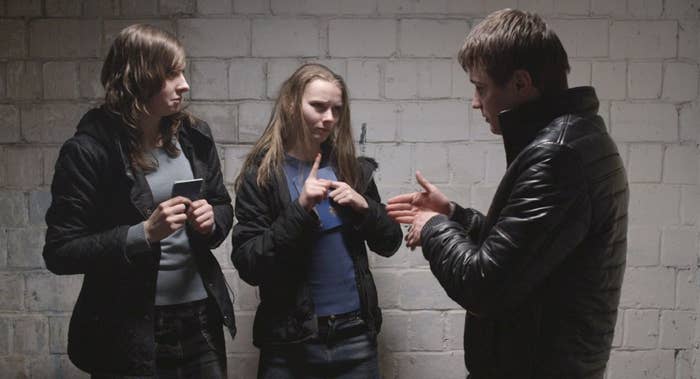
One Friday night in high school, my friends Emily, Jen, and I curled up on Emily's couch watching Four Weddings and a Funeral. During the scene where Hugh’s character and his brother communicate through sign language, they both turned to look at me.
"Do you know what he's saying?" Jen asked.
"Well, yeah. I'm reading the subtitles."
"But I thought you understood sign language!"
"That's British Sign Language."
"What are you talking about? They have a different sign language there? But they speak English! That doesn't make sense!"
I have had variations of this conversation about a thousand times in my life. As the hearing daughter of a deaf dad and hard-of-hearing mom, I've been a staunch pro-ASL activist and have written on issues related to the Deaf community. And while some topics — legally mandated TV captioning, the fact that knowing ASL and English means I'm bilingual — have gotten much easier to explain over the years, there's one thing that everybody keeps sticking on: the fact that sign language is not universal.
Take, for example, the movie The Tribe, which is opening in New York this week. The movie is groundbreaking for being possibly the first one ever to be completely in sign language, without subtitles. Quite a few reviews (including BuzzFeed's) wrote about the film being totally in sign. A few friends forwarded me links about the movie, saying I should check it out because I'd be able to understand it. But the film is set in Ukraine. And that means that the characters communicate in Ukrainian Sign Language, a language I definitely can't understand.
And that's one of the biggest problems with educating people about the Deaf community — simply saying "sign language" isn't sufficient. It's like saying a movie's dialogue was "in Asian." It has simply never occurred to most people that deaf people in different countries might communicate in different languages, even though hearing people in those different countries can't communicate with each other. I make a point of saying "I know American Sign Language" to people, which means that at least half the time the follow-up comment is "Wait, so there are other ones?"
Too often, hearing people try to argue with me about how it would be so much better for deaf people if they could all communicate with each other no matter where they lived. This is yet another example of the paternalism that the Deaf community has long experienced. I wouldn't march into Italy and say that because Italian is mostly only spoken in one country that everyone should be forced to give it up and learn something else.
As Deaf communities assert their independence, they have created more sign languages. The Nicaraguan Deaf community recently invented their very own sign language from scratch. Even if you share a language with only one other person, it is still your language, to use the way you want it.
I think a lot about the lyrics from one of my favorite gym playlist songs, Björk’s “Declare Independence”: “Start your own currency / Make your own stamp / Protect your language.” When people say “But wouldn’t it so much easier if all deaf people just learned the same language?” they mean “But it would be so much easier for me and my understanding if all deaf people just did what a random hearing person thought was easier.”
The languages deaf people use don’t affect hearing people or their lives in any measurable way. This is the same ableist thinking that once resulted in deaf children being forced to put their mouths in vices, spending all day trying to enunciate English words and being told that sign language would make them stupid and unemployable.
And The Tribe is far from the only example of “sign language” being used without any qualifier specifying the community or country it’s from. After that whole “fake interpreter at Mandela’s funeral” thing, my phone lit up with texts from friends who wanted to know if I had spotted the phony. The answer: No, of course, because I don’t know South African Sign Language.
And while I did love that episode of Call the Midwife with a deaf mom-to-be, she was communicating in British Sign Language, so my enjoyment of the storyline was about the portrayal of the deaf character, not her signing. I was psyched when the British soap Hollyoaks cast a deaf character — because of the cultural impact, not the fact that I had to follow along via subtitles like most of the viewing audience. Like many deaf people around the world, I followed the story of the French film La Famille Bélier — about a deaf family whose hearing daughter becomes a singer — with great interest, as the French Deaf community was angered that hearing actors were cast as the parents. (I’d also like to know what the heck “Deaf Sign Language” is.) For me, being part of the global Deaf community means that even though we don’t all use the same language to communicate, there are universalities that bring us together.
And as for the folks who emailed me to ask if I was planning to check out The Tribe: No, I don’t think so. Not because it’s in a language I don’t understand, though — it just looks really freaking depressing.
Thumbnail image: Susan Stevenson/ThinkStock.
